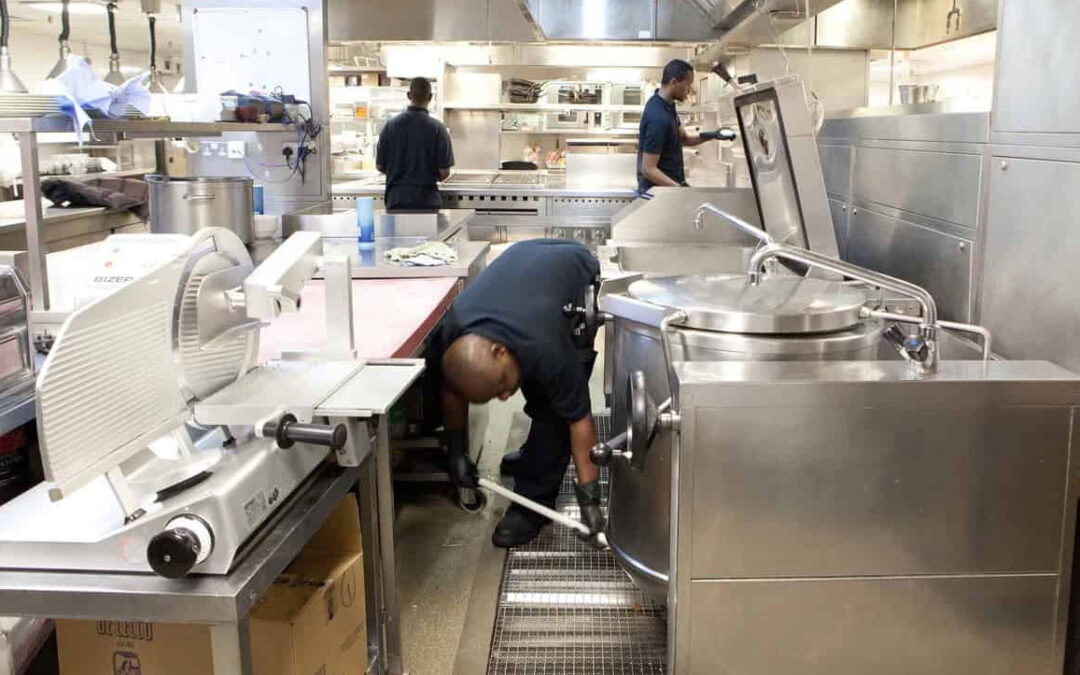In the bustling world of the restaurant industry, maintaining a clean and hygienic environment is not just a matter of aesthetics; it’s a critical component of operational success and regulatory compliance. Restaurant owners and managers must prioritize commercial cleaning to ensure their establishments meet health and safety standards, protect customer well-being, and preserve their reputation. This article explores the importance of compliance in restaurant cleaning and outlines key strategies for effective commercial cleaning practices.

Commercial Cleaning for Restaurants
Importance of Compliance in Restaurant Cleaning
Compliance with health and safety regulations is paramount in the restaurant industry. Regulatory bodies, such as the Food and Drug Administration (FDA) and local health departments, have established stringent guidelines to ensure food safety and prevent contamination. Failure to comply with these regulations can result in severe consequences, including hefty fines, legal action, or even closure of the business. Therefore, maintaining compliance through effective cleaning practices is essential for the longevity and success of any restaurant.
Beyond regulatory requirements, compliance in restaurant cleaning is crucial for safeguarding public health. Restaurants are high-traffic environments where foodborne illnesses can easily spread if proper sanitation measures are not in place. Regular and thorough cleaning of kitchen equipment, dining areas, and restrooms helps to minimize the risk of contamination and protects both customers and staff. By prioritizing cleanliness, restaurants demonstrate their commitment to providing a safe dining experience, which can significantly enhance customer trust and loyalty.
Moreover, compliance in restaurant cleaning contributes to the establishment’s reputation and brand image. In today’s digital age, news of unsanitary conditions can quickly spread through social media and online reviews, deterring potential customers. A clean and well-maintained restaurant not only attracts diners but also instills confidence in the quality of food and service. By adhering to cleaning standards, restaurants can build a positive reputation, differentiate themselves from competitors, and ultimately drive business growth.
Key Strategies for Effective Commercial Cleaning
To maintain compliance and ensure effective commercial cleaning, restaurants should implement a comprehensive cleaning schedule. This schedule should outline daily, weekly, and monthly cleaning tasks, covering all areas of the establishment, from the kitchen to the dining room. Assigning specific responsibilities to staff members helps ensure accountability and consistency in cleaning practices. Regular training sessions can also be conducted to educate employees on the latest cleaning techniques and regulatory updates, fostering a culture of cleanliness and compliance.
Utilizing the right cleaning products and equipment is another key strategy for effective commercial cleaning. Restaurants should invest in high-quality, food-safe cleaning agents that are specifically designed for commercial use. These products are formulated to effectively remove grease, grime, and bacteria without leaving harmful residues. Additionally, using advanced cleaning equipment, such as steam cleaners and industrial vacuums, can enhance the efficiency of cleaning operations and ensure thorough sanitation of all surfaces.
Partnering with professional cleaning services can further enhance a restaurant’s cleaning efforts. Professional cleaners are equipped with the expertise, experience, and tools necessary to tackle the unique challenges of restaurant cleaning. They can provide deep cleaning services that go beyond the capabilities of regular staff, addressing hard-to-reach areas and ensuring compliance with health and safety standards. By outsourcing cleaning tasks to professionals, restaurant owners can focus on their core operations while maintaining a spotless and compliant environment.
In conclusion, commercial cleaning is an integral aspect of running a successful and compliant restaurant. By understanding the importance of compliance and implementing key strategies for effective cleaning, restaurant owners and managers can safeguard public health, enhance their reputation, and ensure the longevity of their business. Whether through meticulous in-house cleaning schedules or by partnering with professional cleaning services, maintaining a clean and hygienic environment is essential for meeting regulatory requirements and providing an exceptional dining experience.


Recent Comments